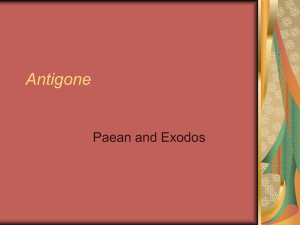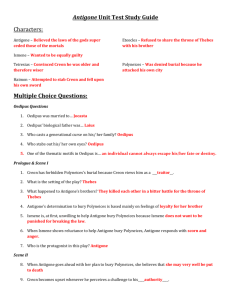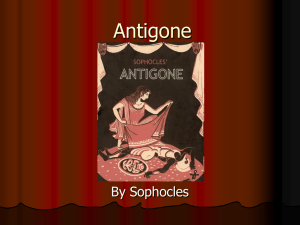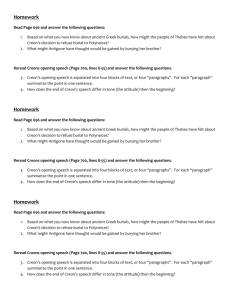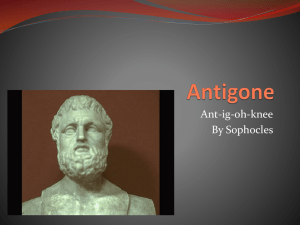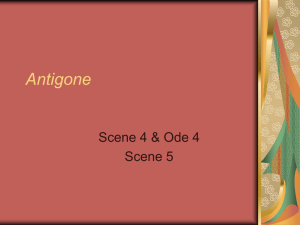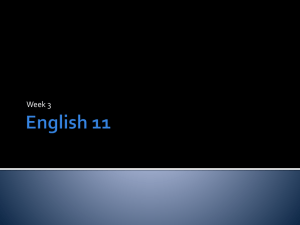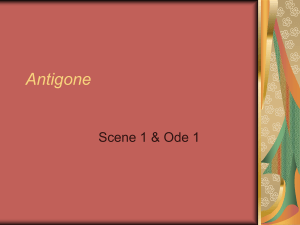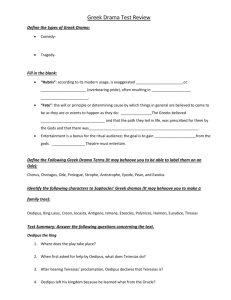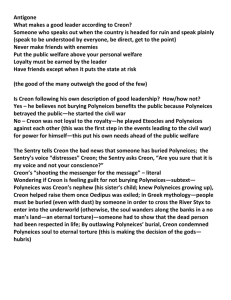Antigone Reading Guide Answers: Summary & Analysis
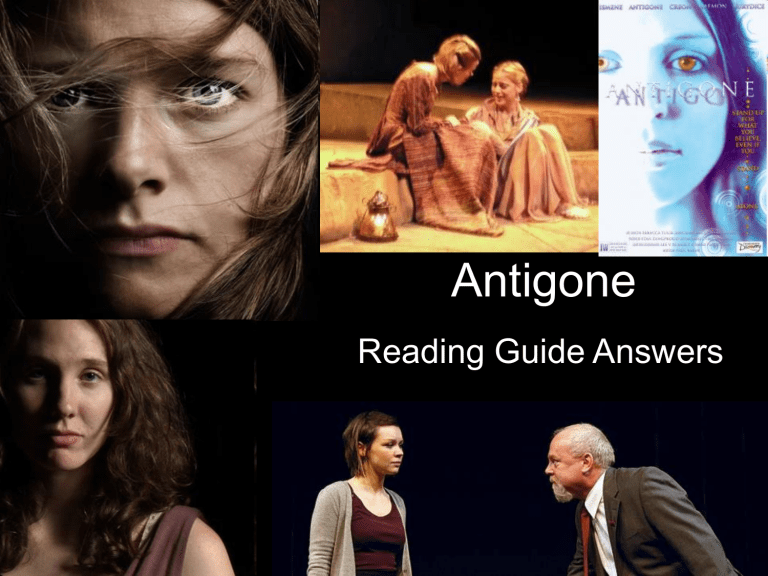
Antigone
Reading Guide Answers
Prologue
1.
“repulse of the Argive army,” Thebes wins, Eteocles & Polyneices die
2. Antigone & Ismene are arguing about burying their brother, Polyneices
Prologue
1. It is the right thing to doGod’s law
2. He is a traitor (broke his exile, made war on his home city and family)
3. Fear & respect for the law
Prologue
6. “we are only women, we cannot fight with men” “I have no strength to break laws that were made for the public good”
“Impossible things must not be tried at all”
7. not loving Polyneices
8. very! Without proper burial the dead person’s soul would wander the Earth without rest for all eternity
Prologue
9. Oedipus- went insane, tore own eyes out
Iocaste- strangled herself
10. No! Tell everyone, they’ll hate you otherwise when they find out what I’ve done
11. If she dies, “that crime is holy” and “it will not be the worst of deaths —death without honor”
Prologue
12. City Elder/Senator, and (choragos) leader of the elders
13. the battle the night before, how Eteocles and Polyneices kill each other in battle
Scene 1
1. Creon
2. What does the future hold; why has he called us together?
3.
A ship “our Ship of State”
4. their loyalty
5. strong and wise, not afraid to make the difficult decisions
6. Polyneices cannot be buried
Scene 1
7. they agree to obey the law
8. the sentry
9. Polyneices has been buried
10. selling his loyalty
11. the sentries threw dice
Ode 1
12. a lyric sung by the chorus which develops the importance of the action
13. the power of human intelligence
14. Intelligence combined with respect for the law
Scene 2
1. Someone buried Polyneices
2. The choragos and sentry talk about who the prisoner is and what she did
3. To mourn him
4. a mother bird who returns to an empty nest
5. I do. I deny nothing.
6. Did you hear of the new law?
7. Yes
8.
It was not god’s law
9. If she had left Polyneices unburied, she would have suffered. Now she is at peace.
Scene 2
10. Breaking the law and boasting of it
11. Ismene
12. They agree with me(Antigone), but out of fear say nothing
13. Eteocles, they are both brothers and
“equal in blood”
14. Yes, if she will let me say so. I am guilty.
Scene 2
15. No, you refused to help!
16. grief teaches the steadiest minds to waver
17. Yours did… when you assumed guilt with the guilty!
18. shock
Ode 2
19. death, the end of the family line
20. the things that humans find enjoyable will get us in trouble
Scene 3
1. Haimon
2. no marriage means more to me than your continuing wisdom
3. He would have to change his mind and admit he was wrong
4. Anarchy, anarchy!
5. He says the people think Antigone did the right thing; “it is not reason to never yield to reason!”
6. Anger
Scene 3
7. He feels they are inferior, “If we are to be defeated, let it not be by women.”
8. Peacemaker
9. Suicide
10. A young man in a rage is dangerous
11. She will not be executed, she is pardoned
12. walled up in a cave with food
13. Love
Ode 3
Scene 4
1. Sad
2. She is dressed for burial
3. You will have a kind of honor since your death is like those of famous demi-gods before, yet unique among humans
4.
Death is death…Antigone is dying an unjust death
5. Her father, Oedipus
Scene 4
6. Only herself, “Your death is the doing of your conscious hand”
7. “Our hands are clean”
Ode 4
8. A woman imprisoned in a tower; her beauty attracts Zeus… the child(Perseus) mistakenly kills a man he failed to recognize as his grandfather. Moral? Be careful who you kill…
9. He was punished for his opposition to the worship of the god Dionysos.
10. A kings’ new wife who blinds the sons of the old wife…
Ode 4
11. The god of war
12. All have tragic endings…
Scene 5
1. A blind prophet
2. Teiresias helped discover that Oedipus married his mother and killed his father…
3. A seat in the temple where Teiresias would deliver his predictions about the future
4. The god of fire and the forge
5. A bunch of birds fighting, tearing each other to pieces
Scene 5
6. He has a boy describe it to him
7. Bury Polynices, you have angered the gods…
8. He thinks Teiresias has been paid to say these things
9. Creon will pay back “corpse for corpse”
10. Fear, “your house will be full of men and women weeping, and curses will be hurled at you from afar”
Scene 5
11. “Go quickly: free Antigone from her vault and build a tomb for Polynices”
Exodus
1. The founder of the city of Thebes
2. The king of Thebes who built the walls of the city
3.
“Fate raises up, and Fate casts down the happy and unhappy alike: no man can fortell his fate” “I would not give so much as the shadow of smoke for all he owns”
4. Creon
Exodus
5. Haimon killed himself, Antigone killed herself
6. Eurydice, Queen of Thebes
7. Unlocking the gate to the temple of
Athena
8. The messenger describes the action in great detail
9. They are gods/godesses of the underworld
Exodus
10. Pray, bathe the corpse in holy water, burn the body and build a barrow over it
11. one of the servants
Exodus
12. I heard a voice grieving within the chamber
13. Haimon
14. she “made a noose of her fine linen veil and hanged herself”
Exodus
15. “that his father had stolen her away from him”
16. Haimon spits in Creon’s face, lunges at Creon, falls own sword & dies
17. Silence, she goes into the palace
18. The silence
19. Check on the Queen
20. “My own blind heart has brought me from darkness to final darkness” It’s all my fault!!!!!!
Exodus
21. Eurydice is dead, suicide
22. Death
23. “I alone am guilty”
24. “No wisdom but in submission to the gods” follow the rules (especially god’s laws)
Antigone
• Description
– sister/daughter of Oedipus
– niece of Creon
– protagonist
– stubborn, headstrong, devout, foolish
• Action
– Bury Polynices
• Motivation
– Divine Law
Ismene
• Description
– sister/daughter of Oedipus
– niece of Creon
– fearful, timid
• Action
– beg Antigone to obey Creon’s law
• Motivation
– Fear
Creon
• Description
– King of Thebes
– Husband of Eurydice
– Antagonist
– Proud, paranoid, vindictive
• Action
– Deny Polynices’ Burial
• Motivation
– Stability, power, pride(Hubris)
Haimon
• Description
– Creon’s son
– engaged to Antigone
– Prince of Thebes
• Action
– Tries to save Antigone
• Motivation
– Will of the people & self about right & wrong
Teiresias
• Description
– Blind prophet
• Action
– Predicts Haimon’s, Eurydice’s death
• Motivation
– Give Creon a chance to save his son &
Antigone
Eurydice
• Description
– Wife of Creon
• (Queen of Thebes)
• Action
– Curses Creon
– Commits suicide
• Motivation
– Creon’s actions caused the death of her last son(Haimon) and Antigone
Antigone confronted by the dead Polynices
Nikiforos Lytras, 1865
Tragic Hero
• Aspects of the Greek Tragic Hero:
– must be of noble birth or hold an important social position
– is generally virtuous
– has a desire to do good deeds
– often dies in the end of the play
Tragic Flaw
• A defect in the character of a tragic hero that brings about the downfall of the hero
• The hero realizes his/her flaw but it is too late…
Hubris
a Greek term, meaning “arrogance”
Oedipus decides to go to Thebes by chariot
Another charioteer tells him to clear the road
Oedipus refuses(he’s in a bad mood)
The other charioteer refuses
Characteristics of Tragedy
• Characteristics of a Tragedy
– A piece of literature (especially a play)
– Protagonist:
– a significant person (king or hero)
– Cause of the tragedy
– a tragic flaw, or weakness (like hubris or greed)
– Purpose?
– Provoke feelings of fear/pity in the audience (Catharsis)
– Convey a sense of grandeur and nobility of the human spirit

